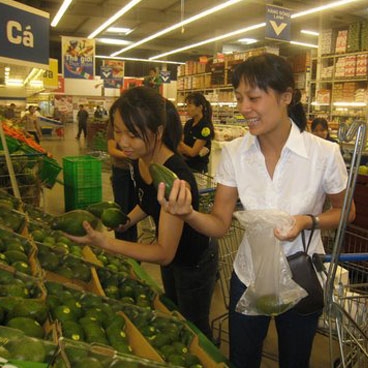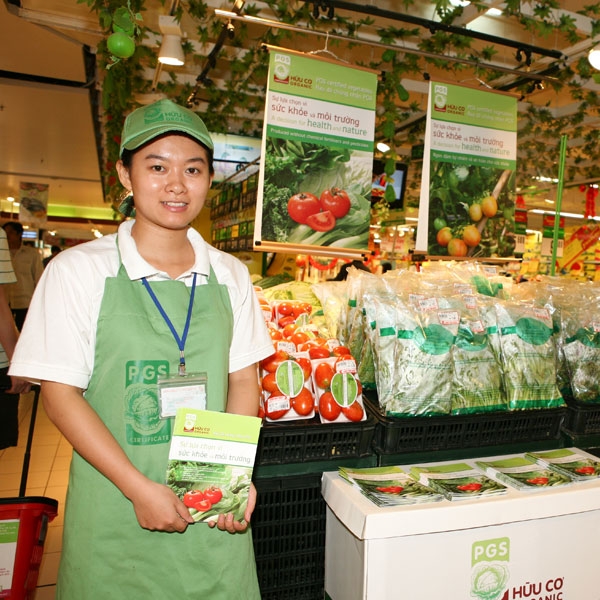HANOI – Sharing experiences about supplying safe, healthy, and high value food in Vietnam requires cross-cutting partnerships and cooperation.
The conference attracted over 175 participants ranging from leading supermarket chains to farmers, fresh produce production companies to research institutes, and government agencies to financial institutions. The different actors discussed the future of safe and healthy food provision in Vietnam.
The morning program presented the different stages of sustainable agriculture development in Vietnam:
Click here for the presentations.
- Vice-Minister of Agriculture, Mr. Dr. Le Quoc Doanh, highlighted the urgency of food safety for the Vietnamese government as well as the importance of stimulating rural development. He emphasized the value of international collaboration: “ With positive collaborations from foreign countries and international organizations in cultivation, production and post-harvest techniques, more and more Vietnamese farmers could access advanced technologies to improve the quality of agricultural products, towards safe, healthy and high value products.”
- To develop sustainable food chains, the Dutch Ambassador in Vietnam, Mr. Joop Scheffers stated that: “The Netherlands is a leading country in agricultural technology and innovation. We have been working with Vietnam for already many years in many sectors like horticulture, fisheries, cocoa, coffee, livestock and dairy. We do so by working with farmers and providing them trainings, by linking farmers with processors and retailers, and by supporting government agencies in drafting relevant regulations.” However, as many Dutchmen would say, the Ambassador closed his key-note speech with: “a lot still needs to be done… To make it successful, your pro-active participation as a consumer, producer, trader, researcher or retailer continues to be essential.”
- Market opportunities of vegetables were indicated by Fresh Studio’s Marketing Director, Sigrid Wertheim-Heck. She illustrated that the vegetable consumption in Hanoi accounts 50% of the total vegetable consumption in The Netherlands. Despite of this fact, she indicated that: “94% of Vietnamese consumers are concerned about safe vegetables; however, the share of vegetables sold with a food safety claim is currently less than 4% of the total vegetable consumption in Vietnam”. Furthermore, she presented that lower income groups have remained an untapped, though potential market for safe quality foods.
- Dr. Nicolas Chevrollier, Programme Manager of BoP Innovation Centre, highlighted the importance of developing specific lower income (also indicated as Base of Pyramid (BoP)) strategies and the approach to develop them. He stated that “The global BoP market is US$ 5 trillion, of which US$ 2,895 billion is spent on food”.
- Fresh Studio’s R&D Director, Mr. Rene van Rensen, presented how Fresh Studio developed a sourcing system for METRO Cash & Carry in North Vietnam. Within this project, Fresh Studio worked with six farmer groups and 110 farmers in three different agro-ecological zones, in order to supply over 30 different certified vegetables. The presentation ended with the honorary awarding of lead farmers for their pioneering work, as well as directors of the supermarket chains who supported the launch of the safe vegetables in their stores.
- The success of the developed value chain for safe vegetables was further highlighted in the presentation of Mr. Philippe Bacac, CEO of METRO Cash & Carry Vietnam. With 19 large stores in Vietnam, 2 sourcing platforms, 100 dedicated cold trucks and 3,000 pallets cold storage space, Metro invested significantly in its supply chain.
Click here for the presentations.
The afternoon program included participatory ‘World Café’ discussions about Food safety and Health, Horticulture, Value Chain Development, Private Public Partnership, and Sourcing and Logistics. Perspectives of the different participants have led to fruitful and interesting discussions.
An exhibition and a marketplace with agro-food related demonstrations including IT innovations in agronomy, hydroponic lettuce cultivation and blind taste tests provided attendants with impressions of developments and activities within the agricultural sector.
The conference resulted in networking opportunities and creation of actionable and future oriented business ventures.https://www.youtube.com/embed/Gru22qA5oWU?rel=0Also interesting to read:









